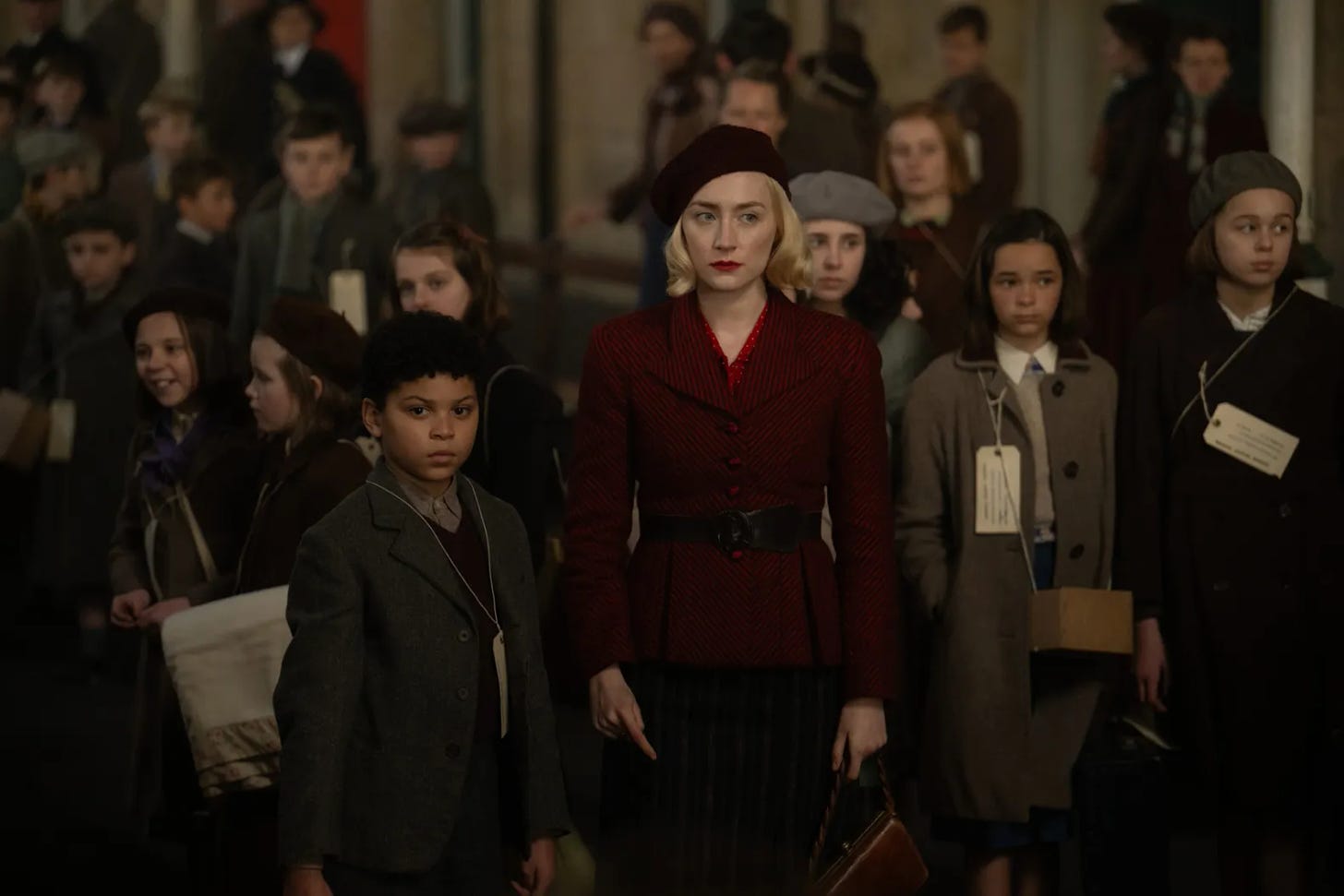In Review: 'Blitz,' 'Emilia Pérez'
An all-review week continues with two big movies from major directors, both of which are or will soon be available on the small screen.
Blitz
Dir. Steve McQueen
120 min.
When it comes to cinematic images that convey widespread chaos by focusing on a single image, it’s unlikely anyone will ever top a baby carriage rolling down the Odessa Steps in Battleship Potemkin, but Steve McQueen has created one that comes close. In the opening moments of Blitz, a drama set in the midst of the Blitz—the World War II operation when German forces rained destruction on England from the skies for eight months, killing more than 40,000 civilians—a group of firefighters struggle to control a firehose that’s slipped from their grip. Coiling, leaping, and collapsing like an angry snake, the very tool designed to save London has joined a cascade of threats.
McQueen never returns to the image, but the rest of Blitz recalls it anyway, portraying a city that might just as easily be destroyed by failures from within as without, as seen by a mother and son trying to survive as the world falls apart around them. Saoirse Ronan stars as Rita, a single mother who lives with her father Gerald (music legend Paul Weller, quite good in his feature film acting debut) and nine-year-old son George (Elliott Heffernan). Rita spends her days working in a munitions factory and her nights either worrying about bombing raids or actively trying to take shelter from them, an action made difficult by the city’s unwillingness to use London’s Underground stations as bomb shelters. It’s hard to keep calm and carry on when you’re part of a crowd pounding on the gates, demanding to be let in as the bombs fall around you.
Rita’s single because George’s father, Marcus (played in flashbacks by C.J. Beckford), a Black man, has been deported, having been charged with assault after acting in self defense against some racist toughs. George’s racial identity complicates the already sensitive kid’s life, a situation only exacerbated when Rita makes the difficult decision to evacuate her son with other London children. Angry at his mother and upset at the taunting of some fellow evacuees, George leaps from the train taking him to safety and begins making his way back to London, a perilous journey that will bring him to an even more perilous destination.
Splitting time between Rita and George, McQueen lets the story play out in episodes. While Rita, at first unaware of her son’s disappearance, tries to find ways to improve life on the homefront by lending her voice to a protest of the Underground closures and helping at a shelter run by a charismatic socialist leader (Leigh Gill), George rides the rails with other runaways then makes his way through unfamiliar corners of London. There he encounters both those who would help him, like a Nigerian immigrant air warden named Ife (tenderly played by singer Benjamin Clementine), and those who would exploit him, like a gang of Dickensian looters led by the ghoulish Albert (Stephen Graham) and Beryl (Kathy Burke).
McQueen’s film is, in many ways, a straightforward wartime adventure tale but one laden with complications and pointed details. As George travels through London, he finds a city, and a nation, struggling to decide what it will be after the war. In one scene, he finds himself in a shopping arcade filled with images of the British empire’s conquests and stereotyped, barely human images of its colonized subjects. In another, Ife tears down a curtain hung by white shelter residents as a wall to divide them from the minorities in nearby cots. His idealistic speech borders on the simplistic, but the film around him depicts the full difficulty of the situation he’s addressing. The Britain in which George will grow up will hardly be free of the racism and division they’re fighting to defeat abroad—assuming George and the nation both survive the war.
That feels like an open question for much of Blitz, which depicts life during wartime with an unnerving intensity. Lyrical moments, like George and some new friends riding through the English countryside atop a boxcar and Rita struggling then succeeding to perform a tender song, mix freely with terrifying bombing scenes and grim sequences, like a chilling before-and-after scene depicting the real-life destruction of the Café de Paris, a club where revelers danced the night away thinking its subterranean location would keep them safe. It didn’t in real life and it doesn’t within the film, but McQueen depicts the London of Blitz as a place where nowhere and no one can feel truly safe. All its characters can do is cling together and hope for a brighter, kinder tomorrow. —Keith Phipps
Blitz is now in theaters and will begin streaming on Apple TV+ on Friday, November 22.
Emilia Pérez
Dir. Jacques Audiard
132 min.
The thing about artists taking big swings is that a miss can corkscrew them into the dirt like a cartoon character squaring off against Bugs Bunny. It happened already this year with Francis Ford Coppola’s Megalopolis, a decades-in-the-making fiasco that was perhaps produced in the wrong Coppola decade. And now it’s happened again with Jacques Audiard’s Emilia Pérez, an audacious genre hybrid that feels like Douglas Sirk by way of Pedro Almodóvar while simultaneously cross-pollinating cartel violence and telenovela plotting with musical numbers that range from speak-singing simplicity to full-on Busby Berkeley extravaganzas. Audiard’s track record suggests he could pull it off, too, given how fluidly he was able to slip from the superb crime drama A Prophet to an underrated follow-up, Rust and Bone, that revealed a soft spot for pop music and fantastical love stories.
Yet an emotional epic about the life of a Mexican cartel boss, before and after her transition into a woman, requires a tactfulness that Audiard, a big swinger by nature, doesn’t seem to possess. That’s not necessarily a death sentence for a movie like Emilia Pérez—there’s ickiness aplenty to be found in Talk to Her, one of Almódovar’s best—but Audiard’s misjudgment extends beyond his handling of a trans protagonist who seems to be in conversation with the person who was once one of Mexico City’s most feared villains. The moral dysphoria that accompanies the film’s gender dysphoria is a provocative starting point, but the whole enterprise feels conspicuously awkward, almost fittingly uncomfortable in its own skin. The cringe-o-meter is too frequently off the charts.
The true center of Emilia Pérez is not Emilia Pérez but her lawyer, Rita (Zoe Saldaña), first shown as a prosecutor who feels shame for successfully exonerating a rich and plainly guilty client from a murder charge. But before she can question her career path, Rita gets a mysterious phone call from someone promising her an opportunity for exceptional wealth if she can meet him outside a newsstand in Mexico City. After a terrifying ordeal in which she’s tossed into the back of a dark SUV with a sack over her head, Rita is led to Manitas (Kara Sofía Gascón), a widely feared drug lord who presents as a man but identifies as a woman. She wants Rita to audition surgeons for gender-affirming surgery and secure a place where she can recover in peace and unwind her connection to the cartel. The world will believe that Manitas is dead.
Emilia Pérez front-loads most of its worst numbers, from a duet between Rita and a Tel Aviv doctor that starts with the clunky song-spoken line “Lady, you know I only fix the body…” to an appalling showstopper that suggests that not even Stephen Sondheim could write his way around “vaginoplasty.” With only a few exceptions, like a song where Rita condemns the wealthy hypocrites and killers who attend a fundraiser to alleviate the problems they worsened, the songs, by French mononym Camille, are cursed by a didacticism that might be unavoidable given what Audiard is trying to do. The film also struggles to incorporate Selena Gomez as Manitas’ wife Jessi, who’s brought back along with their kids to live with her “cousin” Emilia in a gilded cage in Mexico City and takes up again with a lover she’d been seeing on the side. You can see where that might be going.
Nevertheless, the film mostly improves once Emilia completes her transition and attempts to unwind some of the immense harm she caused in her former life. For Emilia to change her outward identity gives her a perilous kind of second chance in which she can play the hero by helping families locate cartel victims while leaving her past life where the bodies are buried. The question Audiard poses is whether that violent, ruthless side of Emilia can ever be suppressed, or whether her moral corrosion persists past the surgery. All of this makes Emilia Pérez an appropriately florid story of sin and redemption, but it seems so abstracted from the social realities it wishes to describe that Mexico City may as well be a Hollywood studio backlot. The film unquestionably triggers a response, though, even if that response is too frequently dumbfoundedness. — Scott Tobias
Emilia Pérez is currently in theaters and streaming on Netflix.









While I enjoyed Emilia Perez quite a bit more than Scott, I will confess that none of the musical numbers wowed me as much as the ones in Blitz (notably NOT a musical). Man, between the Cafe de Paris scene and the one with Rita and Marcus out dancing at a club (not to mention the fantastic Lovers Rock from a couple years ago) is there currently anyone better than Steve McQueen at investing music scenes with more FEELING?
I’m glad I made an effort to see BLITZ on the big screen because I can’t imagine some of its scenes (like that opening with the deadly firehose) having the same impact at home. The same goes for Pablo Larraín’s MARIA, which is getting a limited release next weekend, but most people will be seeing it when it drops on Netflix two weeks later — that is, if they manage to catch it before it’s swallowed up by the churn.